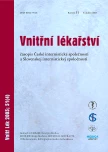-
Medical journals
- Career
What are the risk factors of ischaemic cardiac disease (ICD) knowledge at our physicians? The comparison with the condition in 1991
Authors: J. Widimský 1; T. Pecka 2
Authors‘ workplace: subkatedra kardiologie IPVZ, Praha, ředitel MUDr. Antonín Malina, Ph. D., Klinika kardiologie IKEM, Praha, přednosta doc. MUDr. Josef Kautzner, CSc., FESC 1; NOVARTIS Praha 2
Published in: Vnitř Lék 2005; 51(4): 397-402
Category: Original Contributions
Overview
In 1991 we investigated the knowledge about risk factors of ischaemic cardiac disease at our physicians. The objective of study was to find out changes of the last 12 years. Although the cardiovascular mortality has been decreasing within last 10 years, it stays to be the most often reason of dying in Czech Republic. In 2003 we used the questionnaire about risk factors of ICD for 470 physicians who were taking part at the courses of Institute of postgradual studies in medicine (IPVZ), Prague. The physicians of age 31-40 and younger represented majority of the group. If we compare situation in 1991 with our study, there is the noticeable decline in the group of physicians who don’t know their own levels of big cholesterol (1991 41.6% – 2003 15.8%) and glycemia (34.6%–15.8%). This improvement of both parameters was important. The knowledge of own blood pressure was already in 1991 good – there is no change. The number of physicians in study who don’t know their own blood pressure was 5.6%. 50.6% of physicians in study have known the correct definition of big cholesterol physiological levels, 61.6% in LDL cholesterol, 67.1% in HDL cholesterol and 49.9% in triglycerids. Only 49% of physicians have known the definition of diabetes mellitus according to glycemia on an empty stomach, which is more surprising, because a very important part of respondents were the specialists in the internal medicine. The 75% of the respondents have known the correct definition of hypertension. In spite of the fact the quarter of the respondents does not know the definition of hypertension. As a conclusion we can summarize that the knowledge of the basic risk factors has improved among the physicians but the knowledge of the lipids and blood pressure are hardly optimal.
Key words:
risk factors of ICD – hypertension – diabetes mellitus – lipids – development of knowledge – physicians
Sources
1. Widimský J, Janský P. Jaké jsou znalosti našich lékařů o rizikových faktorech ischemické choroby srdeční. Vnitř Lék 1992; 38 : 693–695.
2. Wood D, De Backer G, Faergeman O et al. Prevention of coronary heart disease in clinical practice. Recommendations of the Second Joint Task Force of European and other Societies on Coronary Prevention. Eur Heart J 1998; 19 : 1434–1503.
3. Guidelines Committee: 2003 European Society of Hypertension–European Society of Cardiology guidelines for the management of arterial hypertension. J Hypertens 2003; 21 : 1011–1053.
4. Cífková R et al. Prevence ischemické choroby srdeční v dospělém věku. Společné doporučení českých odborných společností. Cor Vasa 2000, 42: K225–K234.
5. Expert Panel on Detection, Evaluation, and Treatment of High Blood Cholesterol in Adults (Adult Treatment Panel III). Executive Summary of the Third Report of the National Cholesterol Education Program (NCEP). JAMA 2001; 285 : 2486–2497.
6. Widimský J, Škodová Z, Pecka T. Kuřácké návyky lékařů a lékařek v porovnání s kouřením v populaci České reubliky. Porovnání se stavem v roce 1991. Vnitř Lék 2005; 51(3): 286–290.
7. Škodová Z, Cífková R, Adámková A et al. Dlouhodobý vývoj a současný stav kuřáckých zvyklostí obyvatelstva České republiky. Cor Vasa 2002; 44 : 812–816.
Labels
Diabetology Endocrinology Internal medicine
Article was published inInternal Medicine

2005 Issue 4-
All articles in this issue
- The influence of the combined aerobic training to the changes of autonomous modulation at the ill patients after the acute myocardial infarction
- The pleural effusion in general internal practice
- Molecular pathophysiology of late diabetic complications – genetic predisposition to the development of diabetic complications
- The transplantation of the stem cells in cardiology
- Aortic stenosis, sclerosis, and atherosclerosis
- Hyperhomocysteinemia – is it still the only interesting but diagnostically unsignificant finding?
- What are the risk factors of ischaemic cardiac disease (ICD) knowledge at our physicians? The comparison with the condition in 1991
- The epidemiological analysis of patients with permanent cardiostimulation at the Department of Cardiology in Faculty Hospital Brno-Bohunice
- Klinický význam mírně zvýšených hodnot α−fetoproteinu v séru u pacientů s chronickou hepatitidou C a B
- Rehabilitace po infarktu myokardu a revaskularizaci u starších nemocných
- The uncommon way of noninvasive demonstration of myocardial ischaemia via cold exposure
- Courses on ethics in the faculty of medicine: A route from descriptive ethics to moral norms
- Internal Medicine
- Journal archive
- Current issue
- Online only
- About the journal
Most read in this issue- Klinický význam mírně zvýšených hodnot α−fetoproteinu v séru u pacientů s chronickou hepatitidou C a B
- The pleural effusion in general internal practice
- Aortic stenosis, sclerosis, and atherosclerosis
- Hyperhomocysteinemia – is it still the only interesting but diagnostically unsignificant finding?
Login#ADS_BOTTOM_SCRIPTS#Forgotten passwordEnter the email address that you registered with. We will send you instructions on how to set a new password.
- Career

